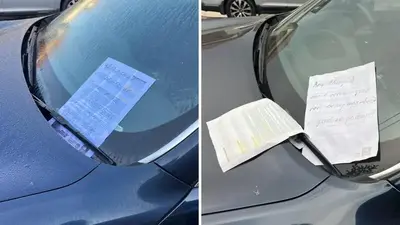Technology
‘Consensual doxxing’ reveals the confronting truth about online privacy - you’re not as hidden as you think
“I’m untraceable” is a mindset held by thousands of social media users who believe their online privacy settings hide their personal details.
But a new TikTok series is revealing a confronting truth – almost everyone can be found.
WATCH THE VIDEO ABOVE: Woman shares how easy it is to find someone online.
Watch the latest news and stream for free on 7plus >>
Chicago woman Kristen, known as @notkahnjunior on TikTok, has been using her platform to share a chilling insight on how easy it is to find someone’s personal details even when they believe their privacy settings are at their highest.
The trend, known as “consensual doxxing”, involves the 32-year-old exposing the name or birthday of people who challenge her to find their details online.
Kristen is not a data privacy expert nor is she trained in cyber security.
But similar to solving a puzzle, she works through the steps to uncover personal information of people who claim to be “top secret” in a bid to show how difficult it is to be truly anonymous online.
Someone may think their profile is tightly locked but their friends could be their downfall, Kristen explains in her videos.
It is most often friends or spouses that leave a trail back to the original person’s accounts, whether that be through commenting on posts, tagged photos or the friend’s usernames and bios.
One user said she paid to have her information “private from the web” and called on Kristen to tell her if she was being “ripped off”.
The task was too easy for the online sleuth, with the woman’s husband the key to finding her details.
“You tag your husband in all your TikToks and his TikTok username is his full name and says what state he’s from on his profile,” Kristen said.
“I went to your TikTok followers and I looked at the first 10 people that followed you and tried to find someone who looked like your friend … I look them up on Facebook.
“Then I went to their friends list and looked up your husband’s name and found his profile, and then I found your profile because you leave heart comments on all of his pictures.
“So, even though your Facebook is just an abbreviated version of your first name and your last name is I assume your middle name, I still found you and I know.”
The woman deleted her account in the aftermath of the video.
Woman reveals confronting truth about online privacy
Even people who seem impossible to find and have zero personal identifiers on their accounts can be traced back to something, Kristen says. There is always a part of their digital footprint left hanging around.
Each time someone uses the internet they leave behind a trail of data in the emails they send, websites they visit and posts they interact with - all of which can be used to track their online activities and devices.
While Kristen’s searches focus mainly on social media trails, they serve as a reminder of how much is available about a person online even if they are trying to be private.
One of her recent videos proves just that.
The user thought he would be a “failed” attempt for Kristen. He had no content posted on his TikTok and did not include his name or where he lived anywhere on his profile.
“All I had was their TikTok profile picture and access to their followers because they don’t have a private account, and guess what … I did it,” Kristen says.
She conceded this attempt was like playing her game on “hard mode”, but she was able to find his birthdate by using his profile picture and his follower list.
“I found this because that person who was his friend on TikTok had the same username (on Twitter) and he replied to him one day ago,” she said, adding that she then found his birthday through old tweets.
Can you ever be private online?
University of Colorado Boulder information science associate professor Casey Fiesler said the “consensual doxxing” series was a “gift” for teaching social media privacy to young people because “you’re almost certainly not as private as you think you are”.
Fiesler said a common privacy failure Kristen identified was even though someone may not use their real name on social media, their friends could give them away.
All it takes is one friend to use their full name on their page and then engage with the initial person’s content to make them easy to find in their friend’s list.
“Another common social media privacy failure: You explicitly don’t share information about yourself on one social media platform but then you use the same username on another platform where you do share more information about yourself,” Fiesler wrote on Twitter.
Her three key lessons for anonymity or privacy online include:
- If you want to be anonymous, do not friend or interact with anyone you know in real life, or at least make sure that they know you want to be anonymous and they need to be careful what they say in your comments.
- If you want to ensure different information about you is available on different platforms, then there cannot be overlap across those platforms - usernames, friends lists, photos, content, etc.
- Your least anonymous social media presence can easily be your privacy failure mode if there is anything to connect your other social media presences to it - including other people.
Once something is online, there is no way to get it completely removed. But there are a few steps you can take to clean up your online presence.
Concerned about your digital footprint? To get an idea of your internet trail, cybersecurity software company ESET recommends starting with a Google search.
- Search for your name and then combine it with your address or phone number and comb through the first five pages.
- If you want to remove a specific mention on a website, contact the website owner and request it.
- Check your privacy settings of the services you use such as Facebook or Twitter.
- Delete what is unnecessary from your social media profiles - old posts, tweets, pictures.
- Ask Google and Bing to remove your personal information. Google has a new tool to remove personal information from its search results.
-

 Technology7h ago
Technology7h agoGet chronic UTIs? Future treatments may add more bacteria to your bladder to beat back harmful microbes
-

 Technology9h ago
Technology9h ago2024’s final supermoon visible tonight in Pakistan | The Express Tribune
-

 Technology1d ago
Technology1d agoEU fines Meta €798 million for Facebook Marketplace's 'abusive practices' | The Express Tribune
-

 Technology1d ago
Technology1d agoSpain's 'La Vanguardia' exits X, citing rise in toxic content | The Express Tribune
-

 Technology1d ago
Technology1d agoThe Gap Between Open and Closed AI Models Might Be Shrinking. Here’s Why That Matters
-

 Technology1d ago
Technology1d agoDenver Broncos on verge of giving fans faster internet as it installs Wi-Fi 6E at stadium
-

 Technology1d ago
Technology1d agoSUPARCO's rover to explore lunar surface | The Express Tribune
-

 Technology2d ago
Technology2d agoXpeng Aeroht secures 2008 pre-orders for modular flying car at Airshow China | The Express Tribune



























